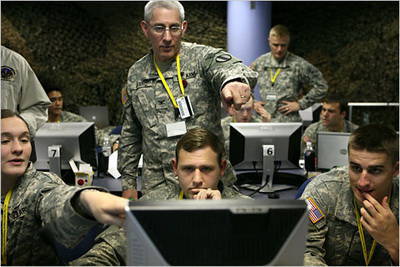Cyberwar - the wars of the future
For the time being such wars are not of a large scale, but already now one can notice local centers of their manifestation. One of the most significant episodes of recent times, many experts recognized the operation against the nuclear power plant under construction in Bushehr. According to experts, the reactor could be damaged as a result of the attack of the Stuxnet computer virus, which caused serious damage to the NPP control system and the station's computer network. Russia and a number of countries in the Persian Gulf, fearing a repetition of the Chernobyl disaster, are putting pressure on Tehran in order to obtain permission to inspect the reactor of the nuclear power plant. In particular, the representative of Russia to NATO Dmitry Rogozin, who supports the holding of a joint Russia-NATO inspection to determine the real state of the nuclear facility, insists on this.
A virus that hit a nuclear facility under construction several months ago came to the station from the outside. The computer control system at the Bushehr nuclear power plant was not connected to the Internet, but this did not help. The virus was brought to the station by someone from the staff or foreign workers and launched into the network, as a result, Iran’s nuclear program was paralyzed. Many are inclined to believe that the Stuxnet virus could have been written by secret cyber divisions of Israel or the United States, which are very concerned about the implementation of the nuclear program in this Middle Eastern country.
The second most significant act of cyberwar in the near future was the publication of a huge amount of secret material on the site Wikileaks. In this case, the hackers themselves were the United States. The secret documents relating to the wars that the USA is leading in Afghanistan and Iraq, and then the publication of the correspondence of American diplomats, became the property of millions of people around the world. The publication of these materials not only jeopardized the lives of many people working with the special services and the US government, but also caused significant damage to American diplomacy and the image of the country as a whole.

How easily a lot of secret documents were in the hands of those interested in this can make it possible to draw conclusions that the United States is vulnerable to attacks of this kind, and is unable to provide an adequate level of protection for the transmission of this kind of data.
This was confirmed by the cyberwar training simulation, which the non-profit organization Bipartisan Policy Center conducted at the beginning of 2010. The aim of the operation was to identify what would have happened to the United States if a massive hacker attack had been used against the country. The experiment called “Shock Cyber Wave” clearly showed that a country with a huge arsenal of nuclear and conventional weapons turned out to be absolutely not ready for cyberwar. In the case of a massive hacker attack, the wireless infrastructure of mobile and wired telephone communications, as well as the power supply system, are extremely vulnerable and can break down overnight, which will disrupt the normal operation of the economy of the whole country.
A cyber war simulation was performed using 230 computers of the experiment participants. All participants were employees of the defense department, private companies working in the field of security, security agencies and public associations. The participants in the experiment easily managed to disrupt the country's power system and telephone network. During the attack, the malicious mobile software began to send out virus programs to other phones, which also actively infected each other. As a result, entire clusters that could not withstand the load on the network began to fall out. Simulation of cyberwar showed that a competent attack can leave 40 million US residents living in the east of the country without electricity just half an hour after it began. After another hour, 60 million mobile subscribers would be surprised to find that their mobile phones had turned into ordinary plastic key chains. And in a couple of hours, the paralysis will get to the center of the financial world - Wall Street.
The scheme of cyber attacks, according to the Bipartisan Policy Center, is that the attack does not occur directly from abroad, but indirectly. First, in a country that has been attacked, computers of ordinary users - law-abiding citizens are infected, and after that the necessary servers, for example, the Pentagon, are attacked from these computers.

Speaking after the experiment, US National Security Secretary Michael Chertoff admitted that the country is completely unprotected from such threats of the modern world and that the state will take all measures in the near future to strengthen its own security. The official stressed that lately the number of attacks from abroad has been constantly growing, largely due to China and the countries of the Muslim world, who are offended by US foreign policy.
In reality, a cyber attack can be a significant threat only if there is a massive collective impact on individual critical points of a system that was previously selected as a victim. Such threats can rarely come from only one anti-social person. They will accept the greatest danger and scale of a real cyberwar only if they are implemented by individual corporations or governments of countries that are able to attract significant technical and human resources for the application of targeted cyberwarders. But even so, the human factor remains a significant factor in this situation, which was confirmed by the case in Iran. Ultimately, no matter how unique and progressive the written malware was, only a person is often able to open or close access to the system.
Cyberwar is gradually occupying more and more military minds around the world. The head of the Australian Defense Ministry, Admiral Chris Barry, called on politicians and soldiers to take a cyberwar as seriously as they do a missile threat. Cyber warfare is a reasonably cheap and effective way of disabling civilian and defense facilities. The irony in this case is that the most technologically advanced countries are the most vulnerable to cyber intrusion. Currently, governments, utilities, private companies and many other organizations are transferring their management activities to the Internet or public data networks. And where there is the possibility of accessing the Internet, there is always the possibility of unwanted penetration from the outside.
Sources used:
www.rususa.com/news/news.asp-nid-53466
www.abirus.ru/content/564/581/582/594.html
www.inopressa.ru/article/28Jan2011/lastampa/iran.html
- Yuferev Sergey
- http://topwar.ru"rel =" nofollow ">http://topwar.ru
Information